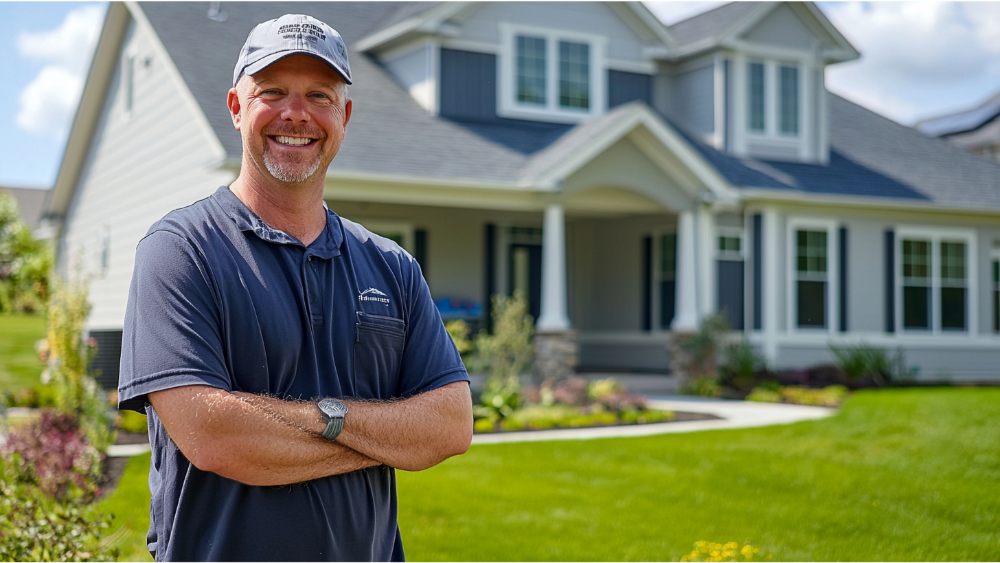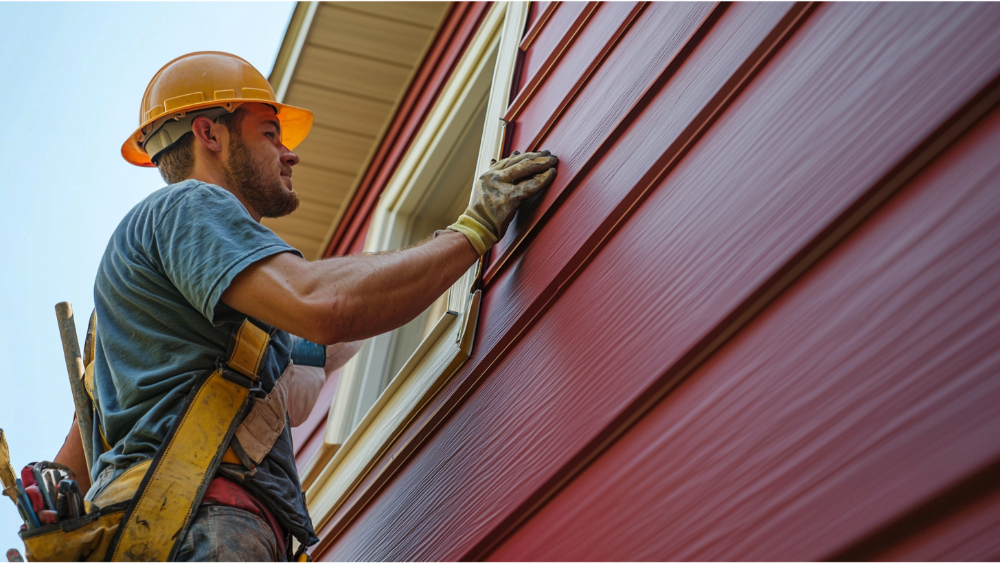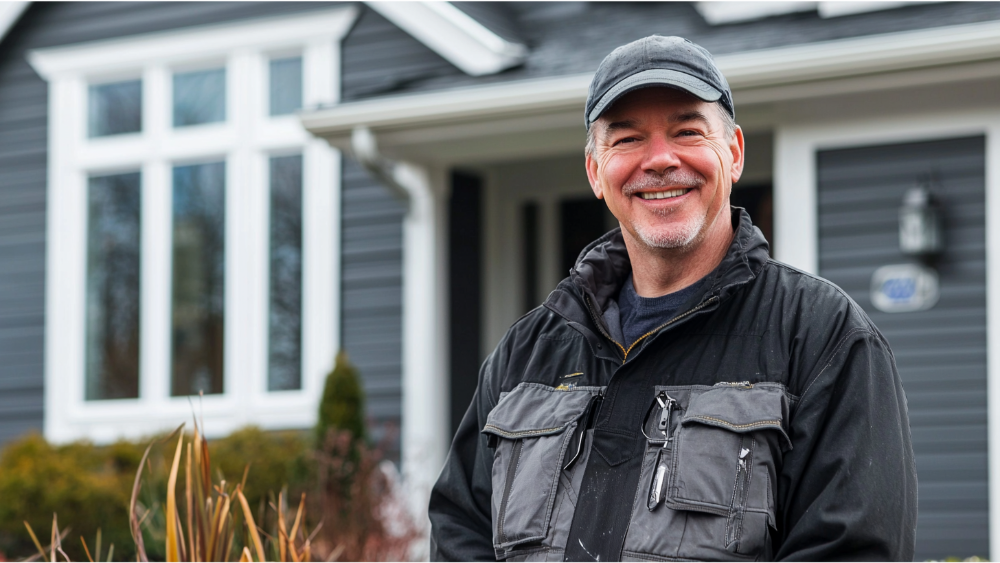Mon to Fri: 09:00 am to 07:00 pm

Mon to Fri: 09:00 am to 07:00 pm

When it comes to the outside of your home, siding is everything. It’s your home’s first line of defense against the weather and a big part of its curb appeal and energy efficiency. So who do you call when you need new siding installed or your existing siding repaired or maintained? That’s where a siding contractor comes in. In this post we’ll go into what a siding contractor does, the services they offer, what makes a good contractor, and how to find one for your project.
A siding contractor installs, repairs, and maintains the exterior siding on homes and buildings. Siding is the first line of defense against the weather, rain, wind, and sun and is also part of your home’s insulation, energy efficiency, and curb appeal. Choosing the right siding contractor is important because proper installation and maintenance can prevent costly damage, reduce energy bills, and increase property value.
Siding contractors offer a range of services for homeowners. These services start with the installation of new siding which could be for a new home or as part of an exterior renovation. A contractor will ensure the siding material is installed correctly, a perfect fit, and maximum protection for your home.
They also do repairs and maintenance, fixing cracks, warping, and water damage to extend the life of the siding. Some contractors also offer consulting services to help homeowners choose the best material for their climate, budget, and personal style.
There are many types of siding materials a contractor may work with, each with its characteristics. Vinyl siding is popular because of its affordability, durability, and low maintenance. It can look like wood but without the upkeep. Wood siding has a classic and natural look but requires regular maintenance and can be prone to rot, insects, and fire.
Fiber cement siding is durable and fire, pest, and rot resistant but is heavier and more expensive to install. Metal siding (aluminum or steel) is for modern or industrial-style homes and is weather and pest-resistant making it good for coastal areas. Insulated vinyl siding adds foam insulation for energy efficiency and the same benefits as regular vinyl.

Choosing the right siding contractor is key to your project’s success. A good contractor will have:
• Experience and Knowledge: A good siding contractor has experience with different types of siding materials and a portfolio of successful installations. They are current with industry standards and best practices.
• Professionalism and Communication: Professionalism is important in any business and siding contractors are no exception. A reliable contractor is clear and prompt, explains technical details in simple language, and respects your time and property.
• Quality Workmanship and Attention to Detail: A skilled contractor pays attention to every detail, from the alignment and sealing of materials to the use of top-quality products for durability and performance.
• Licensing, Insurance, and Certifications: A good contractor should be fully licensed and insured to operate legally, protecting both the client and the contractor’s team from liabilities. Additional certifications for specialized materials or techniques can also mean a contractor is serious about quality.
• Reputation and References: A good siding contractor has good reviews and testimonials from past clients. They should be able to provide references and show you examples of their work, photos, or case studies.
• Open Pricing: Open pricing means providing a clear, itemized quote that shows all costs and potential extra charges without hidden fees. It means the contractor is honest and builds trust with the client.
• Problem Solving: The ability to handle surprises during a project is key. A good contractor has creative and practical solutions to any problems that come up.
• Warranties and Guarantees: Warranties on materials and workmanship means the contractor is confident in their work and stands behind it.
• Safety and Compliance: Following all safety protocols and keeping the job site safe for workers and homeowners is non-negotiable. A good contractor prioritizes safety always.
Choosing the right siding contractor requires research and consideration. Start by asking the right questions. How much experience do they have with the siding material you want? Some contractors specialize in vinyl, others in fiber cement or wood. Make sure the contractor is knowledgeable in the material you want for your project. Check their licensing, insurance, and certifications to protect yourself in case of accidents or damages. Ask about warranties or guarantees they offer on their work and materials for extra peace of mind.
Next, check reviews and references. Look for reviews on reputable platforms like Google, Yelp, or the Better Business Bureau. Look at the overall trend of the reviews, not individual comments. Don’t be afraid to ask for a portfolio of previous work or to contact past clients to get their feedback on the contractor’s service.

The siding installation process starts with an initial consultation where the contractor will assess your needs, explain the different material options, and provide a quote. They will do a thorough inspection of your home to evaluate the condition of the existing siding and determine any prep work required. Proper prep is key to a successful installation and may involve removing old siding, repairing damaged sheathing, and installing a weather barrier to prevent moisture.
Once the prep is done the contractor starts the installation which involves several steps. The siding materials are measured and cut to fit snugly and correctly. The siding panels are installed from the bottom up with each panel overlapping the previous one to create a water-tight barrier. Proper sealing around corners, windows, and doors is key to prevent water intrusion and extend the life of the siding.
During installation, the contractor may encounter issues like uneven walls, moisture, or ventilation needs. Experienced contractors can handle these issues and ensure a smooth and durable installation. They make sure the materials used are compatible with the home’s structure and local climate and use the right installation techniques to maximize performance and longevity.

Regular maintenance is key to extending the life of your siding and keeping your home looking great. Different types of siding require different types of maintenance. For example, wood siding needs to be inspected regularly for damage or decay and repainted and treated for pests. Vinyl siding is low maintenance but still needs to be cleaned occasionally with a soft brush and mild soap to remove dirt and mildew. Fiber cement siding requires less maintenance but should be cleaned occasionally and repainted every 10-15 years depending on the environment. Metal siding maintenance is all about preventing rust and repairing damage from severe weather.
Knowing when to repair or replace your siding is also important. Common signs are fading, cracking or warping of the material, visible water damage or mold growth. An unexpected increase in your energy bill could mean your siding is no longer insulating and needs to be looked into.
• Does the contractor have experience with the type of siding material you want?
• Ask for proof of licensing, insurance, and certifications to make sure they are allowed to do the work.
• Check reviews on Google, Yelp, or the Better Business Bureau.
• Ask for a portfolio of previous work or contact references to verify their expertise and quality of work.
• Make sure they provide a detailed, itemized quote that includes all costs.
• Do they offer warranties on materials and workmanship?
• Do they follow safety protocols and have a good reputation for a safe job site?
• Are they professional and communicate well throughout the process?

When hiring a siding contractor several factors can affect the total cost of the job. The type and quality of material play a big role as different types of siding have different price points. For example, wood and fiber cement are more expensive than vinyl or aluminum. The size and complexity of your home also affect the cost, larger homes or homes with unique architectural features require more labor and material. Labor costs also vary depending on your location and cost of living.
To stay within budget get a detailed estimate that includes material and labor. It’s a good idea to get quotes from multiple contractors to make sure you’re getting a fair price. When comparing quotes consider not just the upfront cost but also the long-term cost of maintenance and the value of any warranties.
Hiring a qualified siding contractor is key to your home’s exterior. By knowing what a siding contractor does, what makes a good one, and how to choose the right one you can make an informed decision that protects your investment. Do your research and consider both short and long-term benefits and your home will be beautiful, energy-efficient, and protected for years to come. Contact a siding contractor today to get started on your next project.
Get a free siding or windows estimate today by simply filling out this form.
Our team members


